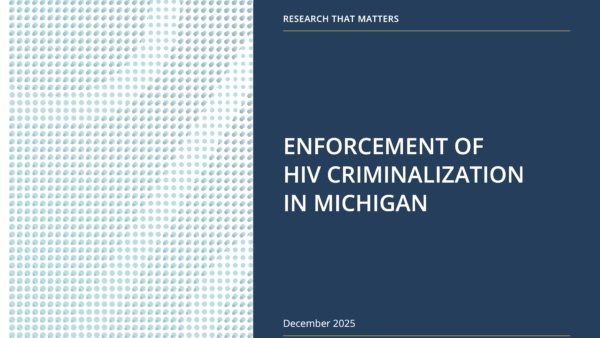
Assembly members propose jailing anyone who spreads infections such as HIV/AIDS with intent
Translated from Spanish via Deep.com. Scroll down for original article in Spanish.
Assembly members propose jailing anyone who spreads infections such as HIV/AIDS with intent: can the transmitter be identified with certainty?
The COIP reform is rejected by civil society organisations because it criminalises those living with sexually transmitted diseases.
The report for the second debate on the draft Organic Law Reforming the Comprehensive Organic Penal Code (COIP) includes a reform that punishes with 1-3 years in prison anyone who intentionally spreads an infectious disease, such as that caused by the human immunodeficiency virus (HIV) or syphilis, in a sexual relationship; that is, when the transmitter has prior knowledge of his or her state of health.
The proposal criminalises anyone who “has sexual intercourse with another person without informing that person of his or her infected status”. Infectious diseases also include hepatitis B, gonorrhoea, among others.
This change is maintained in the report for the second debate in the plenary approved by ten of the Assembly members who are part of the Justice Commission.
The bill brings together 38 previously presented reform proposals. Hence, it is a wide range that covers this issue that involves public health and others, such as drug trafficking crimes, usury, extortion, cattle rustling and more possibilities at the time of investigating certain crimes.
A UNAIDS technical note issued on 15 February 2024 states that “there is no evidence that criminalisation of HIV transmission has public health benefits” and that “the proposed bill may undermine effective responses to HIV in Ecuador”.
Furthermore, the statement adds, “criminalisation of HIV exposure or transmission may lead to a miscarriage of justice”.
The application of laws criminalising HIV exposure or transmission can lead to “serious miscarriages of justice and other related problems,” the agency notes, including the following:
– Selective application of the law.
– Difficulty with evidence and testimony.
– Breach of confidentiality and privacy.
– Uninformed assessment of the risk and harm of HIV infection.
“It is feared that prosecution for HIV exposure or transmission may deter people living with HIV or those at higher risk of HIV infection from seeking HIV prevention, treatment, care and support services,” the report notes, precisely “for fear of prosecution”.
But is this reform enforceable and can it effectively determine who transmitted the virus?
Infectiologist Washington Aleman says the issue of criminalisation of sexual transmission of HIV/AIDS is not new. “It’s something old: it arose 40 years ago, when the pandemic was first diagnosed. Now we know the diseases much better, and these kinds of repressive methods are not conducive to fighting this pandemic. Repressing, imprisoning or persecuting is not the way to fight an infectious disease. Education is the way.
It is impossible, the specialist adds, to determine exactly who is infecting whom, especially in developing countries such as Ecuador.
“If tomorrow you have sexual activity with ten people without any precautions and four of them have HIV, how are you going to know who infected you? And the second thing is a question of which word carries more weight, because it would be a confrontation between two people who would accuse each other. So these are confusing scenarios.
The use of condoms, even more so in a casual relationship, is the action that should be applied to prevent venereal diseases as part of a personal decision.
“Do you think a person who has sporadic and transient relationships is going to tell their HIV status even if they are? It’s not going to happen. So you have to be practical and maintain proper self-care,” adds Alemán.
The latter goes hand in hand with the undetectable status of people living with HIV, a status that is achieved with access to retroviral treatment. In this situation, the virus is not transmitted, he adds.
Infectious disease specialist Milton Chang points out that the application would be a play on words between the accuser and the accused. On the medical side, in developed countries it is possible to analyse all the characteristics of the virus and see if they correspond, but it is complex and in Ecuador there is no technology.
“To test for resistance to the antiretrovirals (HIV treatment) we use in Ecuador, we have to send the samples to Colombia, because it is not possible here in the country, sequencing a virus to say that it is exactly the same as the one someone else has is more complex, but it is possible,” says Chang.
There is a window period to know if the virus was contracted from the time of exposure, which ranges from four to ten days, he adds. “Current tests have shortened this period, which used to be one month, with the fourth-generation elisa tests.
The problem would be determining how long each person has had HIV in their system if both people are just finding out, as this is highly variable depending on the immune system. “It would be difficult to determine who infected whom.
Specialist Chang believes that morally, people living with HIV should inform their sexual partners of their HIV status.
Alarming rise in reported HIV cases in Ecuador, where there are 45,078 people with the disease: Fear of discrimination limits access to medical services
Transmission through sharps accidents is low-risk, says Alemán, because it is not direct from blood to someone’s vein. “In these pricks with an infected needle we have to evaluate and, according to that, give preventive treatment; but the risk is below 0.01%, it is not a frequent practice of HIV transmission”.
The HIV virus lives inside the cell, it is thermolabile (easily altered by the action of heat); that is, when it leaves the body to the environment it dissects easily, explains Alemán.The risk is higher with blood transfusions and sharing syringes for injecting drugs.
Reform is difficult to implement
From a legal point of view, says criminal lawyer Julio César Cueva, the reform would be difficult to implement. “The problem, more than anything else, is strictly evidentiary. It would be a ‘You told me’ and ‘You didn’t tell me’. You are going to be intimate with someone and, just in case: ‘Sign here that you told me’. It’s difficult.
There are people who don’t know they have the disease and find out when the partner they were with later discovers it after a test. “The accused will say they didn’t know they had it,” he adds.
Cueva says that the reform responds to the fact that there are people who do know their HIV status and have unprotected sex with other people on purpose. Even if its application is not effective, he says, it is better to have such a measure in the COIP: “It is better to have it and not need it than to need it and not have it. It’s better to have it and not need it than to need it and not have it. You don’t know what kind of new infections will come out in the future.
The Ecuadorian Federation of LGBT+ Organisations (lesbian, gay, bisexual, transgender and the rest of gender diversity) rejects the specific proposal to criminalise the sexual transmission of infections. “The article in question seeks to criminalise the transmission of HIV/AIDS, which represents a serious threat to the human rights of people living with the disease,” it said in a statement.
Diane Rodriguez, National Director of the LGBT+ Federation, points out that the approach is contrary to paragraph 2 of Article 11 of the Constitution, which “recognises equality between all persons, without anyone being discriminated against for any distinction, personal or collective, such as living with HIV”.
“The criminalisation of HIV/AIDS transmission has been widely criticised by international organisations, such as the World Health Organisation (WHO) and UNAIDS (Joint United Nations Programme on HIV/AIDS),” the activist adds.
The criminalisation of HIV/AIDS and the way it is being treated publicly will only increase stigma and discrimination towards people living with HIV/AIDS, says Rodriguez: “There is no scientific evidence that criminalisation of HIV/AIDS is effective in preventing transmission of the virus.
The UN/AIDS report highlights possible consequences, such as putting women at greater risk of criminal prosecution because they are the first to know their HIV status due to the routine offer of HIV testing in antenatal care settings. “Therefore, women who first become aware of their HIV status may be blamed for ‘introducing HIV into the relationship’ and face prosecution for HIV transmission or exposure.”
Asambleístas proponen encarcelar a quien propague infecciones como VIH/sida con intención: ¿se puede identificar con certeza al que transmite?
La reforma al COIP es rechazada por las organizaciones de la sociedad civil debido a que criminaliza a los que viven con enfermedades de transmisión sexual.
El informe para segundo debate del proyecto de Ley Orgánica Reformatoria al Código Orgánico Integral Penal (COIP) incluye una reforma que sanciona con 1-3 años de cárcel a quien propague una enfermedad infectocontagiosa, como la que causa el virus de inmunodeficiencia humana (VIH) o la sífilis, en una relación sexual de manera intencionada; es decir, cuando quien transmite conoce previamente su estado de salud.
En la propuesta se criminaliza a quien “mantenga relaciones sexuales con otra persona sin informarle de la condición de infectado”. Entre las enfermedades infecciosas está también la hepatitis B, gonorrea, entre otras.
Este cambio se mantiene en el informe para segundo debate en el pleno aprobado por diez de los asambleístas que son parte de la Comisión de Justicia.
El proyecto aglutina a 38 planteamientos de reforma presentados previamente. De ahí que es un abanico amplio que abarca este tema que involucra a la salud pública y otros, como los delitos del narcotráfico, usura, extorsión, abigeato y más posibilidades en el momento de investigar ciertos delitos.
Una nota técnica de ONUSIDA emitida el 15 de febrero de 2024 indica que “no hay evidencia de que la criminalización de la transmisión del VIH tenga beneficios para la salud pública” y que “el proyecto de ley propuesto puede socavar las respuestas efectivas al VIH en Ecuador”.
Además, agrega el comunicado, “la penalización de la exposición o transmisión del VIH puede conducir a un error judicial”.
La aplicación de leyes que penalizan la exposición o transmisión del VIH puede provocar “graves errores judiciales y otros problemas relacionados”, señala el organismo, como los siguientes:
- Aplicación selectiva de la ley.
- Dificultad con las pruebas y los testimonios.
- Violación de la confidencialidad y la privacidad.
- Evaluación desinformada del riesgo y daño de la infección por el VIH.
“Se teme que el enjuiciamiento por exposición o transmisión del VIH pueda disuadir a las personas que viven con el VIH o a las que corren mayor riesgo de contraer la infección por el VIH de buscar servicios de prevención, tratamiento, atención y apoyo relacionados con el VIH”, señala el informe, justamente “por temor a ser procesados”.
¿Pero es aplicable esta reforma y se puede determinar con efectividad quién transmitió el virus?
El infectólogo Washington Alemán afirma que el tema de la criminalización de la transmisión sexual del VIH/sida no es nuevo. “Es algo viejo: surgió hace 40 años, cuando recién la pandemia fue diagnosticada. Ahora conocemos mucho mejor las enfermedades, y este tipo de métodos represivos no favorecen la lucha contra esta pandemia. Reprimir, encarcelar o perseguir no es el camino para luchar contra una enfermedad infecciosa. El camino es la educación”.
Es imposible, agrega el especialista, lograr determinar con exactitud quién contagia a determinada persona, sobre todo en los países en vías de desarrollo, como Ecuador.
“Si mañana se tiene actividad sexual con diez personas sin medidas de cuidado y, de esas, cuatro tenían VIH, ¿cómo vas a saber quién te infectó? Y lo segundo es una cuestión de qué palabra pesa más, porque sería un careo entre dos personas que se acusarían entre sí. Entonces, son escenarios que generan confusión”.
El uso del preservativo, más aún en una relación ocasional, es la acción que debe aplicarse para prevenir las enfermedades venéreas como parte de una decisión personal.
“¿Crees que una persona que mantiene relaciones esporádicas y transitorias va a decir su estado serológico aunque lo sea? No sucederá. Entonces, hay que ser prácticos y mantener el cuidado personal adecuado”, agrega Alemán.
Esto último va de la mano de la condición de indetectable de los portadores del VIH, estado que se consigue con el acceso al tratamiento retroviral. En esa situación no se transmite el virus, añade el médico.
También hay otros métodos de prevención, como la profilaxis preexposición (PrEP) y profilaxis posexposición (PEP).
El infectólogo Milton Chang indica que en la aplicación se daría un juego de palabras entre el que acusa y el acusado. En la parte médica, en los países desarrollados se pueden analizar todas las características del virus y ver si corresponden, pero es algo complejo y en Ecuador no hay la tecnología.
“Si para probar resistencia a los antirretrovirales (tratamiento para el VIH) que usamos en Ecuador tenemos que enviar las muestras a Colombia, porque acá en el país no es posible, secuenciar un virus para decir que es exactamente el mismo que tiene otra persona es más complejo, pero sí se puede”, dice Chang.
Hay un periodo de ventana para conocer si se contrajo el virus desde que se dio la exposición, que va de cuatro a diez días, agrega. “Las pruebas actuales han achicado este periodo, que antes era de un mes, con las pruebas elisa de cuarta generación”.
El problema estaría en determinar qué tiempo ha tenido cada persona el VIH en su organismo en el caso de que las dos personas recién se estén enterando, ya que eso es muy variable según el sistema inmunológico. “Sería complicado determinar quién contagió a quién”.
El historial médico finalmente puede determinar desde cuando una persona conoce que tiene el virus.
Y si el posible acusador, pues, comprueba que no lo tenía con alguna prueba previa a la exposición.
El especialista Chang cree que moralmente las personas que viven con VIH deben informar a sus parejas sexuales su estado serológico.
La transmisión a través de accidentes cortopunzantes es de bajo riesgo, dice Alemán, porque no es directo de la sangre a la vena de alguien. “En estos pinchazos con una aguja infectada hay que evaluar y, de acuerdo a eso, dar un tratamiento preventivo; pero el riesgo está por debajo del 0,01 %, no es una práctica frecuente de transmisión de VIH”.
El virus del VIH vive dentro de la célula, es termolábil (que se altera fácilmente por la acción del calor); es decir, al salir del cuerpo al medioambiente se diseca fácilmente, explica Alemán.
El riesgo sí es mayor en las transfusiones de sangre y al compartir jeringas para la inyección de drogas.
La reforma es difícil de aplicar
Desde el punto de vista jurídico, dice el penalista Julio César Cueva, la reforma sería difícil de aplicar. “El problema más que nada es estrictamente probatorio. Sería un ‘Me dijiste’ y ‘No me dijiste’. Se va a tener intimidad con alguien y, por si acaso: ‘Firma aquí que me dijiste’. Es difícil”.
Hay personas que no saben que tienen la enfermedad y se enteran cuando la pareja con la que estuvieron después lo descubre tras una prueba. “El acusado dirá que no sabía que lo tenía”, añade.
Cueva asegura que la reforma responde a que sí hay personas que conocen su estado serológico y mantienen relaciones con otras personas sin protección a propósito. Más allá de que su aplicación no sea efectiva, precisa, es mejor tener en el COIP una medida de este tipo: “Es mejor tenerla y no necesitarla que necesitarla y no tenerla. No se sabe qué tipo de infecciones nuevas saldrán a futuro”.
La Federación Ecuatoriana de Organizaciones LGBT+ (lesbianas, gais, bisexuales, trans y el resto de la diversidad sexo-genérica) rechaza la propuesta específica de penalizar la transmisión sexual de infecciones. “El artículo en mención busca criminalizar la transmisión del VIH/sida, lo que representa una grave amenaza para los derechos humanos de las personas que viven con esta enfermedad”, señala en un comunicado.
Diane Rodríguez, directora nacional de la Federación LGBT+, indica que el planteamiento es contrario al numeral 2 del art. 11 de la Constitución, que “reconoce la igualdad entre todas las personas, sin que nadie pueda ser discriminado por cualquier distinción, personal o colectiva, como por ejemplo vivir con VIH”.
“La tipificación de la transmisión del VIH/sida como delito ha sido ampliamente criticada por organismos internacionales, como la Organización Mundial de la Salud (OMS) y ONUSIDA (Programa Conjunto de las Naciones Unidas sobre el VIH/Sida)”, añade la activista.
La criminalización del VIH/sida y la forma como está siendo tratada públicamente solo aumentará el estigma y la discriminación hacia las personas que viven con VIH/sida, señala Rodríguez: “No existe evidencia científica que demuestre que la criminalización del VIH/sida sea efectiva para prevenir la transmisión del virus”.
El informe de ONU/sida enfoca posibles consecuencias, como poner en mayor riesgo de enjuiciamiento penal a las mujeres porque son las primeras en conocer su estado serológico debido a la oferta rutinaria de pruebas del VIH en los entornos de atención prenatal. “Por lo tanto, las mujeres que se dan cuenta por primera vez de su estado serológico pueden ser culpadas de ‘introducir el VIH en la relación’ y enfrentarse a un proceso judicial por transmisión o exposición al VIH”.









